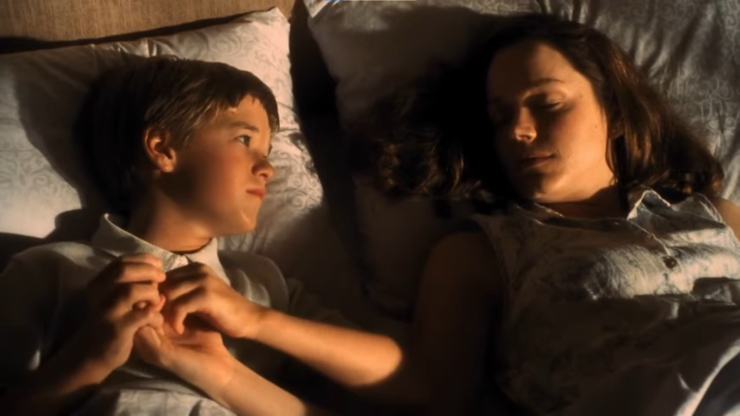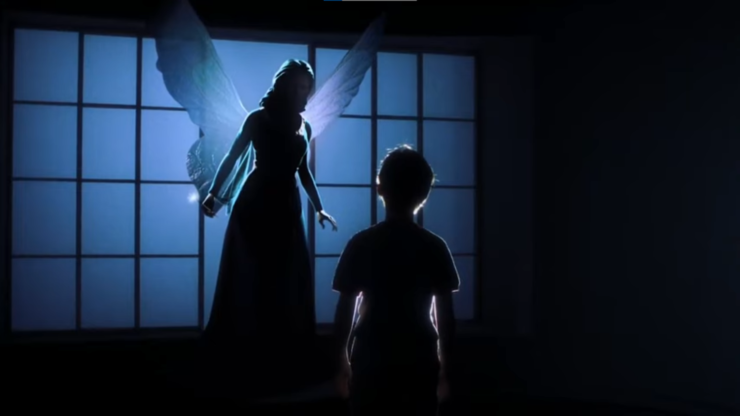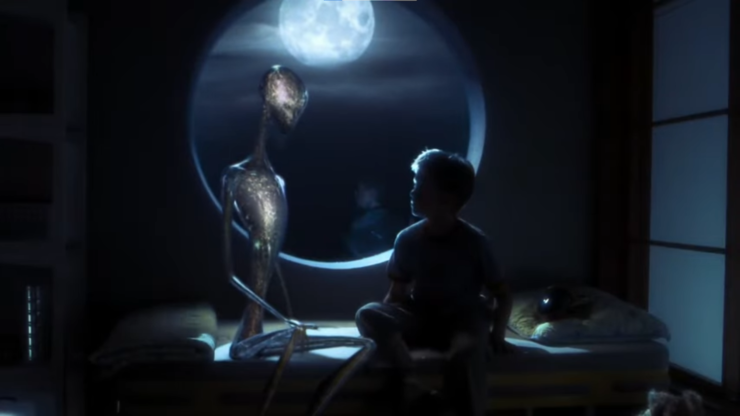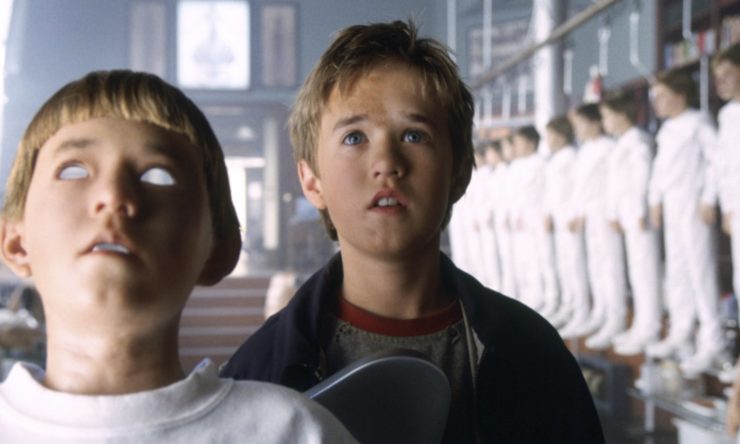I have a fantasy about June 26, 2001. I have a fantasy about a certain person, a die-hard, unapologetic Kubrick acolyte, who has come to witness the debut of Steven Spielberg’s A.I. Artificial Intelligence. There she/he sits, in the very first row of the very first screening…but not to watch Spielberg pay homage to friend and mentor Stanley Kubrick, who developed and largely fleshed out the original idea for A.I. (with a significant contribution from Ian Watson) before passing it on to Spielberg in the belief that the director of Close Encounters of the Third Kind and E.T. the Extra-Terrestrial could better navigate the film’s emotional beats. No, this person has come with an expectation, born of a certain over-simplified preconception of Kubrick, of Spielberg.
This person has come to witness his/her worst nightmare come true.
For the first two hours and change, it must have been hard. Kubrick and Watson are credited with the story, but Spielberg takes sole screenplay credit, his first in twenty-four years. As a result, A.I. is admittedly an odd mixture of styles. There’s a Spielbergian, fairy-tale patina to the story of David, a childlike robot played by Haley Joel Osment, who’s abandoned by his “mother” and subsequently goes on a quest to find Pinocchio’s benevolent Blue Angel, in the hopes of becoming a real boy. But an uncanny cynicism keeps creeping in around the edges, from the myriad, horrendous ways the passive, serene androids are dispatched in the garish Flesh Fair, all the way to David’s ostensibly Geppetto-esque creator (played by—who else?—William Hurt at his warmest and most paternalistic), who’s nonetheless unabashed about abusing his human-like androids if it will help him make a point, and whose ultimate goal is not a single, precious life-like boy, but an army of money-making affection-synthesizers rolling off the assembly line. My imaginary Kubrick supplicant must have sat there—fingernails digging into armrests, each crunch of popcorn withering to the flavor of pure ash in her/his mouth—waiting for that moment when their cinematic god would be betrayed, only to find him/herself thwarted at each beat.
And then, at precisely two hours, twelve minutes, and forty-three seconds, it came. And that person was finally able to leap up from her/his seat, and cry to the world, “I KNEW IT! I KNEW IT! YOU COULDN’T RESIST, COULD YOU? YOU HAD TO TAKE THE MASTER’S BRILLIANCE AND SLAP YOUR SPIELBERG SCHMALTZ ALL OVER IT. DAMN YOU TO HELL, YOU SONUVABITCH! DAMN YOU!”
Or something like that. Probably didn’t happen. No, definitely didn’t. I think we would have heard about it.
That aggrieved outburst, if ever it had come, would have been during A.I.’s coda, set two thousand years after the film’s main story, when a group of crystalline androids retrieve David from the bottom of New York’s Lower Bay and give him what he had been seeking from the submerged Blue Fairy for two millennia: One perfect day with a mother (Frances O’Connor) who finally tells him she loves him. It was there, in what a large chunk of A.I.’s audience perceived as those over-sentimentalized final minutes, that the film’s infamy was cemented.
For all the wrong reasons.

The standard rap goes like this: A.I. Artificial Intelligence should have ended a half-hour earlier, with David pinned underwater by a collapsed, Coney Island Ferris wheel, begging an effigy of the Blue Fairy to make him a real boy…begging ‘til the end of time. That was the grim, despairing image that—in the minds of many—would have paid appropriate tribute to Kubrick and his legacy. By this interpretation, the far-future coda was just Spielberg attempting to paint a happy face—with perhaps a single, poignant tear—on a much darker concept.
Oh, yes. So very Spielberg. But no.
For one thing, both Spielberg and Watson have confirmed that the coda was always part of Kubrick’s plan. Spielberg may have put his own spin on it, but, then, what of that? When one’s view is clouded by a reductive understanding of the famous director’s rep—Spielberg as the magical wizard of family-friendly film whose tales are spun of kitten dreams and candy floss—it’s way too easy to dismiss the finale as sappy melodrama.
But it’s no big news that Spielberg’s oeuvre, for all his weaknesses—which he does have—and strengths—of which there are many—was never just sentimental, soft, or sweet. His breakthrough film, Jaws, pushed mainstream cinema’s limits for explicit violence and gore; Schindler’s List was unsparing in its depiction of Nazi atrocities; the abduction sequence of Close Encounters is mounted as pure horror; hell, even sweet, dreamy E.T. begins with an unsettling sequence that put more than few eight-year-olds on edge. Spielberg has never shied away from the darkness, and when he’s tried, it hasn’t gone so well. (Is Hook anything other than Spielberg and Robin Williams collectively crying, “Who do I have to fuck to get out of this arrested-development, man-child horseshit?”)

Admittedly, A.I.’s final act has been reconsidered and reanalyzed over the years, with critics conceding that it’s not merely the gooey curtain-dropper it appears on the surface. But even there, the focus tends to settle specifically on what the end means to David’s journey, and his implied death after having achieved his mission to become a real boy. But there’s something even darker in that finale that seems often to be missed. Something that would resonate strongly with what we know about Kubrick, his views of humanity, and his thoughts about its ultimate fate.
There’s a moment at the end when one of the androids—which, parenthetically, bear a striking resemblance to the Giacometti sculptures that Kubrick at one point had planned to use as models for the never-seen aliens of 2001: A Space Odyssey—explains to David that robot society has been searching for any connection to the long-dead human race, culminating in futile attempts to recreate the species. The question is: Why? Why would they need to do that? There are no overt indications that the machines David interacts with are academics, or archaeologists—there’s no suggestion of a museum or zoo in which the once-dominant inhabitants of Earth would be enshrined. As much as all that background could be inferred, I don’t think it was intended.
Buy the Book


A Psalm for the Wild-Built
Think of the timeline here: We fade out on David begging the Blue Fairy to make him a real boy. At that point in the story, he exists in a world where machines exist to serve their human masters, passively, uncomplainingly, to the extent that they’ll willfully go off to their own, violent demises if so ordered. Even David, built to (at least exhibit) love, is nothing without a human—a mother, specifically—with whom to interact. We then fade in, returning to the world two thousand years in the future. The human race is now effectively extinct, but to the surprise (and, possibly, disappointment) of Terminator fans, the fatal event seems to be a self-inflicted, environmental apocalypse (remember those rising tides?), not a superior robot army grown tired of humanity’s foofaraw. In fact, as technologically advanced as these crystalline, graceful androids appear, their demeanor is not much different from the compliant machines of David’s time.
And it’s because, I think, they aren’t different. Humanity has died out, but without ever granting their electronic progeny full sentience. As much as a Singularity of a sort may have been attained—at least to the extent that the robots have enough autonomy to improve their own technology—the androids’ sole motivation remains that of being of service to humans. And so (to fall back on a recently-coined Rick and Morty-ism), an Asimov Cascade occurs: In the absence of humans to serve, the androids must recreate humans, so those humans may be served. What they find instead is David, “the enduring memory of the human race.” His synthesized humanity is just convincing enough that when the (presumably) head android hears David’s demand to have his mother recreated, and responds, “Give him what he wants,” it’s not out of empathy, but because something that at least exhibits the recognizable markers of humanity has at last delivered what the robots have been seeking for two millennia: an order.
Does David’s perfect day with his mother seem overly sentimental? Yes. Maybe that’s Spielberg falling back on old habits. Or maybe it’s Spielberg deliberately using those habits to posit what machines, with no emotional history to speak of, would synthesize for a robot whose own emotional history is just as superficial. When viewed that way, the final fade out, as the lights dim in the recreated home and David drifts off “to that place where dreams are born,” is not the bittersweet culmination of a young robot’s wishes fulfilled, but something far bleaker. David—the machine that would be a boy—has delivered the very last order his fellow robots will ever fulfill, and what we have witnessed in that “perfect” day is a simulation of humanity, the best these highly advanced robots can manage, but falling far short of the real thing, almost to the point of mockery. David’s departure then represents the closing chapter of a rare and precious commodity: the human spirit. The Earth is left in the custodianship of brilliant machines, totally lacking in motivation beyond their own propagation. Gone is inspiration, imagination, passion. Gone now, finally, totally, is true humanity, never to be recovered.

A.I. Artificial Intelligence is, to put it mildly, a problematic film. Stanley Kubrick wasn’t completely wrong in feeling that Steven Spielberg was a fitting inheritor of his tale, and Spielberg wasn’t completely wrong in the steps he took to reconcile the ideas of his mentor with his own vision. Still, despite Kubrick’s wit and Spielberg’s bent toward darkness, it’s an uneasy mix, Spielberg’s dreamy, fairy-tale mise en scene dancing precariously with Kubrick’s treatise on how humans could inadvertently engineer the demise of the thing that makes them human. Still, looking back at the film two decades later, there should not be any argument that Spielberg didn’t honor his commitment to Kubrick, right through to the very last seconds. In so doing, he gave us a compelling reminder of what we should cherish about our humanity, and the efforts we need to expend to make sure it doesn’t gutter out and die like the final dreams of a robot who wished to be a real boy.
I’m no good at being noble, but it doesn’t take much to see that the problems of a highly sophisticated child android don’t amount to a hill of beans in this crazy world. But your opinions do! I’ve given my take on A.I., now it’s time for you to give yours. Keep it friendly, keep it polite, and feel free to comment below.
Dan Persons has been knocking about the genre media beat for, oh, a good handful of years, now. He’s presently house critic for the radio show Hour of the Wolf on WBAI 99.5FM in New York, and previously was editor of Cinefantastique and Animefantastique, as well as producer of news updates for The Monster Channel. He is also founder of Anime Philadelphia, a program to encourage theatrical screenings of Japanese animation. And you should taste his One Alarm Chili! Wow!










